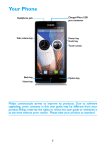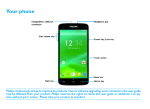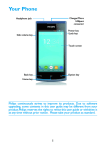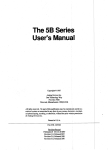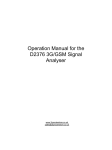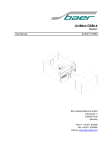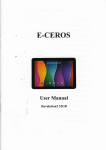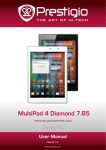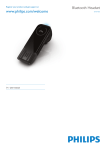Download Philips Xenium CTW6610NY Navy
Transcript
Your phone Headphone jack PowerSave button Side volume key Power key /Lock key Touch screen Back key Home key Option key Charger/Micro USB port Philips continuously strives to improve its products. Due to software upgrading, some contents in this user guide may be different from your product. Philips reserves the rights to revise this user guide or withdraw it at any time without prior notice. Please take your product as standard. Turn your phone on and off Keys 1 Press and hold power key to turn on your Learn about the main keys.m Key Definition Function Power - Press and hold to power on/off. - Press to turn on/off the screen display. phone. 2 To turn off your device, press and hold power key and then select Power off. Note: • If you are turning on your phone for the first time, follow the on-screen instructions to set up your device. Lock/unlock the touch screen You can lock the touch screen and keys to prevent any unwanted device operations. 1 To lock, press power key. 2 To unlock, press the icon finger in any direction. , and then flick your M O B Home key - Hold to access the Phone options, choose Silent or Airplane mode. - Return to the home screen. - Hold to open the list of recent applications. Option - Open a list of options available key on the current screen. - On the home screen, open the Wallpaper, Manage applications and System settings. Back key - Return to the previous screen or exit. - Hide the onscreen keyboard when it is opened. Your phone 1 PowerSa ve button Side volume key Slide the button down/up to turn on/off PowerSave. -Adjust the ringer volume while in standby mode or adjust the voice volume during a call. -When receiving an incoming call, briefly press down either volume key to mute the ringtone. Use the touch screen Learn basic actions to use the touch screen. Flick Briskly scroll up, down, left, or right to move through lists or screens. Pinch Place two of your fingers far apart, and then pinch them together. In some apps, like web browser, you can pinch the screen using two fingers(for example, thumb and index finger) to zoom in or zoom out when viewing a picture or a web pages. Customize home screen Function Operation You can customize the home screen to match your preferences. Tap Touch once to select or launch a menu, option, or application. Function Operation Add items Tap Tap and hold Tap an item and hold it for more than 2 seconds. to enter into menu screen or widgets, tap and hold an item, and then drag it to home screen. Drag Tap an item and move it to a new location. Move items Tap and hold an item, and then drag it Double-tap Tap an item twice quickly. 2 Your phone to a new location. Remove items Tap and hold an item till the Remove icon appears at the top of the home screen. Drag the item to the Remove area to delete it. Select a wallpaper In home screen, press O>Wallpaper or tap and hold the blank area in home screen, select an image from options. Status Bar Search input window Widgets and applications Menu key:Tap to enter into applications Home screen From the Home screen, you can view your device’s status and access applications. Shortcut icons The Home screen has multiple panels. Scroll left or right to view the panels on the Home screen. There are 5 extended home screen, slide your finger horizontally to the left and right to check each one. Your phone 3 Notifications panel When you get a new notification, you can open the Notifications panel to see what event notification or new information you have received. - To open the Notifications panel,press and hold the status bar, then slide one finger downward. If you have several notifications, you can scroll down the screen to see them all. - To hide the panel, drag the bottom of the panel upwards. From the notifications panel, you can also view your phone's current status and use the each options. - Open the notifications panel and then tap to open the phone's status panel. - Place two fingers on the status bar, then slide your fingers downward. 4 Your phone Icons and symbols Learn about the icons and symbols on the screen. Icons Function Your phone will not ring when receiving a call. Call in progress. You have a missed call. Connected to PC. USB debugging connected. Your phone will vibrate when receiving a call. Bluetooth is activated. Flight mode activated. The alarm clock is activated. The bars indicate the battery level. FM radio turned on in the background. (Blue bars) normal charging. Music is playing in the background. (Blue bars) normal charging when the phone is turned off. Error occurred or caution required. The headset is plugged into the phone. WLAN activated. Your phone is connected to a GSM network. The more bars are shown the better the reception is. Your phone is connected to network. Downloading data. Uploading data. Your phone 5 Table of contents Getting started . . . . . . . . . . . . . . . . . . . . . . . . 7 Assembling and Charge . . . . . . . . . . . . . . . . . . . . . 7 Insert a Micro SD card (Memory card) . . . . . . . . . 9 Personalize your phone . . . . . . . . . . . . . . . . . . . . . 10 Basic function . . . . . . . . . . . . . . . . . . . . . . . . . 12 Calls . . . . . . . . . . . . . . . . . . . . . . . . . . . . . . . . . . . . 12 Messages . . . . . . . . . . . . . . . . . . . . . . . . . . . . . . . . . 13 MultiMedia . . . . . . . . . . . . . . . . . . . . . . . . . . . . 14 Music. . . . . . . . . . . . . . . . . . . . . . . . . . . . . . . . . . . . 14 Camera . . . . . . . . . . . . . . . . . . . . . . . . . . . . . . . . . . 15 Business applications . . . . . . . . . . . . . . . . . . . . 19 PowerSave . . . . . . . . . . . . . . . . . . . . . . . . . . . . . . . 19 Alarm . . . . . . . . . . . . . . . . . . . . . . . . . . . . . . . . . . . 20 Connections . . . . . . . . . . . . . . . . . . . . . . . . . . 21 Bluetooth . . . . . . . . . . . . . . . . . . . . . . . . . . . . . . . . 21 Wi-Fi . . . . . . . . . . . . . . . . . . . . . . . . . . . . . . . . . . . . 21 Mobile network sharing . . . . . . . . . . . . . . . . . . . . . 22 Settings . . . . . . . . . . . . . . . . . . . . . . . . . . . . . . 23 Wireless&Networks. . . . . . . . . . . . . . . . . . . . . . . . 23 Device. . . . . . . . . . . . . . . . . . . . . . . . . . . . . . . . . . . 24 Personal . . . . . . . . . . . . . . . . . . . . . . . . . . . . . . . . . 24 Account . . . . . . . . . . . . . . . . . . . . . . . . . . . . . . . . . 24 System. . . . . . . . . . . . . . . . . . . . . . . . . . . . . . . . . . . 25 6 Table of contents Safety & Precaution . . . . . . . . . . . . . . . . . . . . .26 Precaution . . . . . . . . . . . . . . . . . . . . . . . . . . . . . . . .26 Tips . . . . . . . . . . . . . . . . . . . . . . . . . . . . . . . . . . . . .27 Troubleshooting . . . . . . . . . . . . . . . . . . . . . . . . . . .27 Trademark Declaration . . . . . . . . . . . . . . . . . . . . . .29 Specific Absorption Rate Information. . . . . . . . . . .29 Declaration of Conformity . . . . . . . . . . . . . . . . . . .30 Getting started Congratulations on your purchase and welcome to Philips! 1 Remove the back cover. To get the most of your product and enjoy all Philips has to offer, register your product at: www. philips. com/mobilephones More details about your product, please access: www.philips.com/support Note: • Please read the safety instructions in the "Safety & Precaution" section before use. 2 Insert the SIM card. Assembling and Charge Learn about installing SIM card and charging the battery for the first use. Insert SIM card Follow the steps below to insert your SIM card. Remember to turn off your mobile phone before removing the back cover. Getting started 7 Note: • SIM1/SIM2 both support 3G&2G network. Based on the default settings of your phone, it will connect 3G network by SIM1 directly. Also you can enter into Settings>Wireless & networks>Mobile networks>3G service to get your personal settings. the upper-right corner shows the battery level of charging status. 3 Replace the back cover. Tips: • • Charge the battery • The battery is built-in and can not be took out. The new phone is partially charged. The battery icon in • 8 Getting started You can use the phone while it is charging. Keeping the charger plugged to the mobile phone when the battery is fully charged will not damage the battery. The only way to turn off the charger is to unplug it, so it is advisable to use an easily accessible power socket. If a fully charged phone left unused, it will lost its charge over time. If the phone is being used for the first time or the phone has not been used for a prolonged period, it may take longer time to recharge. Insert a Micro SD card (Memory card) Insert a memory card You can expand the memory of your phone and store more additional multimedia files by adding a micro-SD card. 1 Remove the back cover. 2 Align your micro-SD card with the slot. Put it in Remove the memory card Ensure that the phone is not currently accessing the memory card. Before removing a memory card, first unmount it for safe removal. 1 In Idle screen, select O> System settings> Storage >Unmount SD card. 2 Push the memory card gently until it disengages from the phone. 3 Remove the memory card. place. Note: • Do not remove a memory card while the device is transferring or accessing information to prevent corrupting or damaging the files in the memory card. Format the memory card Formatting your memory card on a PC may cause incompatibilities with your device. Format the memory card only on the device. In Idle screen, select O> System settings> Storage >Erase SD card. Note: • Before formatting the memory card, remember to make backup copies of all important data stored on your device. The Getting started 9 manufacturer’s warranty does not cover loss of data resulting from user actions. Personalize your phone Time and Date In idle screen, tapO> System settings> Date&time to control how time and date appears on your device. • Automatic date & time: Set to receive time information from the network and update the time and date automatically. • Automatic time zone: Set to receive time zone information from the network when you move across time zones. • Set date: Set the current date manually. • Set time: Set the current time manually. • Select time zone: Select a time zone. • Use 24-hour format: Set to show the time in 24-hour format or 12-hour format. • Select date format: Select a date format. Tips: • If the battery remains fully discharged, the time and date will be reset. 10 Getting started Set a screen lock You can lock your device by activating the screen lock feature. In idle screen, tapO>System Personal>Security>Screen lock. • • • • • • settings> None: Disable the screen lock. Slide: Choose slide to unlock the screen. Voice Unlock:Set a voice recognition unlock. Pattern: Draw a pattern to unlock the screen. PIN: Unlock the screen by enter the PIN code. Password: Create your private password to unlock the screen. Lock your SIM card You can lock your phone with the PIN that is supplied with your SIM card. 1 In idle screen, tapO> System settings> Security> Set up SIM card lock> Lock SIM card. 2 Select the SIM card, enter your PIN and select OK. • • Note: Manage applications If you enter an incorrect PIN too many times, your SIM card will be blocked. You must enter a PIN unlock key (PUK) to unblock the SIM card. If you block your SIM card by entering an incorrect PUK, take the SIM card to your service provider to unblock it. learn about how to view the running apps, and Access applications • Scroll left or right to another screen, select an application. • On the Home screen, tap to access the application list. • Press B to return to the previous screen, press M to return to the Home screen. • Access recently-used applications: Press and hold M to view the applications you have accessed recently. • In idle screen, tap O>Manage apps. • Tap Running, you can view all the running apps, tap this app to enter it, you can tap Stop to choose stop running. • Tap Downloaded, you can view all the downloaded apps, tap this app to enter it, you can check the detailed information of this app, tap Uninstall to choose unloading it. • Tap SD card, you can view the apps downloaded on the SD card, you can choose to move these apps to the phone. Tips: • Your device has a built-in motion sensor that detects its orientation. If you rotate the device while using some features, the interface will automatically switch to landscape view. To set the interface to keep the orientation when you rotate the device, select Settings>Display>Auto-rotate screen. Getting started 11 Basic function Calls Learn to use calling functions, such as making and answering calls, using options available during a call or customizing and using call-related features. Contacts Call log Make a call 1 In the application list, tap . 2 Dial the number directly or choose one number from the filtered list that have matching digits. 3 Make a voice call or a video call. 4 Tap to end the call. Tips: • The phone dialer’s Smart dial features makes it quick and easy for you to make a call. Simply enter the phone number or first few letters of the person’s name you want to call. Smart dial automatically searches and filters your stored contacts and the phone numbers from the call history. Note: • • For international calls, long press 0 to enter the “+” sign for the international prefix. It is illegal in many areas to record a call without permission. Always ask the other party for permission before recording a call. 12 Basic function Make a voice call Turn on/off dial pad Make a video call Answer/Reject a call 1 During an incoming call, press and hold and then drag your finger right to answer the call, drag left to reject the call.(Press the side volume key to adjust the volume). 2 Tap to turn on loudspeaker. 3 Tap to hang up. Make a conference call Messages If network applicable, you can handle two or more calls, or make a conference call. You can use your phone to send text message and multimedia messages. 1 During a call, tap + to enter a phone number, Send a message and then tap to dial the number. The second number is dialled. 2 The first call is put on hold at this time. 3 Tap to switch the phone, tap to start conference. 4 To end the call, tap to hang up. 1 In the application list, tap . 2 Tap New message . 3 Enter the number or tap 4 Make an emergency call 5 Without a SIM card in phone, you can make the emergency call. 6 In Europe, the standard emergency number is 112; in the UK, it is 999. 7 to select the number from phonebook. Select the text field and enter your message text. PressO>Add subject and add a subject for the message. Tap and attach a file. (Pictures, Videos, Audio or Slideshow) Tap to send the message. Note: Tips: • If you've enabled but forgot your lock password or lock pattern, you can still make emergency calls by tapping Emergency call on the screen. • Copyright protected pictures and sound cannot be sent by MMS. Basic function 13 MultiMedia Music Listen to your favorite music while go with the music player. M Play music 1 Tap tto open the music screen. 2 Select a music category. 3 Using the following keys to control playback. Music settings Function • • • • • • 14 MultiMedia Definition Play and resume playback. Pause the playback. Select previous track. Select next track. Select the play mode: • Repeat once (play current file repeatedly) • Repeat all (play all the files in the folder repeatedly) Activate Shuffle mode, play current file randomly. Select to enter into playlist. Return to the home screen. Press O to enter into Settings: • Party shuffle: Play all the files in the folder randomly. Add to playlist : Add new music to your playlist. Use as ringtone: Choose music as ringtone. Delete: Delete the music from playlist. Sound effects: Select a sound effect. Library: Return to music category. Search:Search for a music. Note: • When listening to music, adjust the volume to a moderate level. Continuous exposure to high volume may impair your hearing. Camera Learn about camera function. Let you take photos as desired by using your phone. Camera setting camera shotcuts Take a photo/video 1 In the application list, select . 2 Tap to switch to the camcorder.. 3 Aim the camera lens at the subject and make any necessary adjustments. 4 To zoom in, place two fingers on the screen and slowly spread them apart. To zoom out, pinch them together. 5 Tap where you want to focus on the preview screen.The focus frame moves to the place you tapped and changes to green when the subject is in focus. 6 Select to take a photo/video.The photo/ video is saved automatically. Take a photo View photos MultiMedia 15 Camera shortcuts Option Function Switch Flash setting Normal Auto scene Simply select the proper detection mode for your shooting conditions and subjects. Smile shot Set the device to recognise people’s faces and help you take photos of them when they smile. Best shot Select the best mode for your shooting. EV bracket Adjust the exposure value for shot your shooting. Settings Camera settings. Switch to the front camera to take a photo of yourself. You can turn on or off the flash manually, or set the camera to use the flash when needed. Take photo in normal mode. mode HDR Take three photos with different exposures and then combine them to improve the contrast ratio. Beauty Hide facial imperfections. Panorama Take panoramic photos. Multi angle You can capture shots of a view moving subject and then combine them into a single photo that shows the action. 16 MultiMedia Camera settings Option Function GPS location Set the camera to include location info information for your photos. Exposure Adjust the exposure value to change the brightness. Color effect Apply a special effect, such as sepia or black and white tones. Scene mode Change the scene mode. White White balance enables the camera balance to capture colors more accurately by adjusting to your current lighting environment. Image Select a quality level for your Properties photos. Anti-flicker Reduce blur caused by the device's vibration or movement. Restore Restore to default settings. Continuous Continuous shooting function. shot Picture size elect the size of picture. ISO Adjust the sensitivity of the imaging sensor. Face beauty Hide facial imperfections. EIS Adjust the EIS level. Microphone Turn on/off microphone. Audio mode Activate the meeting mode to improve the quality of recording. defaults Timer lapse Select the length of the delay before interval the camcorder starts recording a Zero shutter Turn on zero shutter delay, which delay will help capture the picture. Effects Face Detection Self timer Set the device to recognise people’s faces and help you take photos of them. Select the length of the delay before the camera takes a photo. video. Apply a special effect. Video quality Select a quality level for your photos. MultiMedia 17 View photos After taking photos, select the image viewer icon to view the taken photos or tap to view photos. • To view more photos, scroll left or right. • To zoom in or out, place two fingers on the screen and slowly spread them apart or pinch them together. To return to the original size, double-tap the screen. • To send a photo to others, tap . • Press the Option key O to access the following options: - Delete: delete the photo. - Slideshow: To start a slide show. - Edit: To edit the photo with the image editor. - Rotate right: To rotate the photo clockwise. - Rotate left: To rotate the photo anticlockwise. - Crop:To add the photo to the clipboard. - Set picture as: To set the photo as your wallpaper or a contact image. - Details: To view the detailed information of this photo. 18 MultiMedia Business applications PowerSave Slide the button on the left side of the phone down/ up to turn on/off power save. 1 In the application list, tap . 2 You can select Best mode or My mode: - Best mode: Retain call, SMS, disable data connection. - My mode: User can customize their own powersave mode. Tap to enter into my mode setting: set Brightness, Sleep time, select whether to disable WLAN/mobile data/blue tooth/GPS and whether to clean running Apps. Business applications 19 Alarm Learn about how to set and use an alarm. Set an alarm 1 In application list, tap . 2 Tap >On and set the details of the alarm, or turn on the existing alarm. Stop an alarm When the alarm rings, • Select • Select : The alarm stops. : The alarm will sound again after 10 minutes. Create a world clock Tap to select a city in the world list. Use the stopwatch Tap >Start to begin the stopwatch.When you are finished, select Stop. • Tap , delete files. 20 Business applications Connections Bluetooth Note: Your phone can connect to a compatible Bluetooth device for exchanging data. • • Turn on/off Bluetooth 1 From the Home screen, tap > Bluetooth. 2 Select to turn on/off the Bluetooth. 3 Tap the Bluetooth to enter into it for other bluetooth settings. Note: • Turn off Bluetooth when not in use to save battery power, or in places where using a wireless device is prohibited, such as on board an aircraft and in hospitals. Send data via Bluetooth 1 Select a file or item, such as a contact, calendar event, memo, or media file, from an appropriate application or My files. 2 Select an option for sending data via Bluetooth. 3 Search for and pair with a Bluetooth-enabled device. Wi-Fi Receive data via Bluetooth 1 Turn on the Bluetooth firstly, then tap Some devices, especially headsets or hands-free car kits, may have a fixed Bluetooth PIN, such as 0000. If the other device has a PIN, you must enter it. Received data is saved to the bluetooth folder. If you receive a contact, it is automatically saved to the phonebook.. > Bluetooth to make device visible. 2 Then select Search for devices. 3 Select a device, Enter a pair password and select Learn to use your phone’s wireless networking capabilities to activate.You can connect to the Internet or other network devices anywhere an access point or wireless hotspot is available. Accept to pair with the other device. 4 On the receiving device, accept the file. Connections 21 Turn on Wi-Fi and connect to a Wi-Fi 3 Select USB tethering to activate the USB 1 From the Home screen, tap tethering feature. Your device shares the mobile network connection on your PC. 4 To stop sharing the network connection, tap to turn off USB tethering. >Wireless & networks> Wi-Fi. 2 Drag the Wi-Fi switch to the right, turn Wi-Fi on. 3 Your device searches for available Wi-Fi APs automatically. 4 Select an AP. 5 If you selected a secured network, you'll be asked to enter the network key or password. 6 Select Connect. Mobile network sharing Learn to set your device as a wireless modem or wireless access point for PCs or other devices, and share your device's mobile network connection. Share mobile network via USB 1 Using a USB cable, connect the multifunction jack on your device to a PC. 2 In the application list, select Settings>Wireless and network>More>Tethering & portable hotspot. 22 Connections Settings Wireless&Networks Definition . SIM Set the dual SIM card management information/set the SIM card for data connection, call, message. Wi-Fi Activate the Wi-Fi feature to connect to a Wi-Fi AP and access the Internet or other network devices. Bluetooth Activate the Bluetooth feature to exchange information over short distances. Data usage Keep track of your data usage amount, and customise the settings for the limitation. Airplane mode Activate Flight mode to disable all wireless functions on your device. You can use only nonnetwork features. VPN Set up and manage virtual private networks (VPNs). Function Tethering& •Set to use your device as a portable hotspot wireless modem by making a USB connection with a computer. •Set to use your device as a wireless access point for other devices. •Activate the Bluetooth tethering feature to share your mobile network with computers via Bluetooth. Mobile networks •Set to use data connections on any mobile network. •Set to use data connections when you are roaming. USB Internet Sharing Windows PC internet via USB cable Settings 23 Device Function Audio profiles Display Storage Battery Apps 24 Settings Personal Definition . •Select the profiles of the phone. •Set the volume and type for ringtong, alarm and notification. Change the settings to control the display and backlight on your device. View memory information for your device and memory card.You can also format the memory card. View the amount of battery power consumed by your device. Manage running applications, move applications to or from the storage card, and install or uninstall programs. Function Definition . Location access Select the sources to use when determining your location. Set a screen lock or manage the credential storage. Language&input Set the operating system language and region. You can also set onscreen keyboard options. Backup&reset Reset your settings to the factory defaults and delete all your data. Security Account Add your email accounts. System Function Date&time Scheduled power on&off Accessibility Definition . •Set the date and time, time zone, and date or time format. •Choose the time and date formats that suit you. Set the time to power on/off automatically. Use these settings when you’ve downloaded and installed an accessibility tool, such as a screen reader that provides voice feedback. You can turn accessibility functions or services on or off. Developer options About phone Tap About phone>Build number for seven times, you can open the Developer Options. Activate and change the settings for application development.. View different information about the phone, such as the battery, legal information, model number, software version, base band version and build number. If the network is available, tap System updates to update the system to latest version. Settings 25 Safety & Precaution Precaution Keep your phone away from small children Keep your phone and all accessories out of the reach of small children. Small parts may cause choking or serious injury if swallowed. Radio Waves Your phone transmits/receives radio waves in the GSM/WCDMA. Check with the vehicle manufacturer that electronic equipment used in your vehicle will not be affected by radio energy. Switch off your phone... Turn off the phone when in an aircraft. The use of mobile phones in an aircraft may be dangerous for the operation of the aircraft, disrupt the mobile phones network and may be illegal. In hospitals, clinics, other health care centers and anywhere else where you may be in the close vicinity of medical equipment. In areas with a potentially explosive atmosphere (e.g. petrol stations and also areas where the air contains dust particles, such as metal powders).In a vehicle transporting flammable products or a vehicle powered by liquefied petroleum gas (LPG).In quarries or other areas where blasting operations are in progress. Your mobile phone and your car Avoid using your phone while driving and obey all regulations that restrict the use of mobile phones while driving. Use hands free accessories to increase your safety when possible. Ensure that your phone and car kit do not block any air bags or other security devices fitted in your car. Handle your phone carefully and sensibly For the optimal and satisfactory operation of the phone you are recommended to use the phone in the normal operating position. 26 Safety & Precaution • Do not expose your phone to extreme temperatures. • Do not immerse the phone in any liquid; if your phone is damp, switch it off, remove the battery and let them dry for 24hrs before using them again. • To clean the phone, wipe it with a soft cloth. • In hot weather or after prolonged exposure to the sun (e.g., behind a window or a windscreen), the temperature of your phone's casing might increase. Be very careful in this case when picking up your phone and also avoid using it with an ambient temperature over 40° C. Protect batteries from damage You should only use Philips Authentic Accessories, as the use of any other accessories may damage your phone and may be dangerous, and will make all guarantees for your Philips phone null and void. The use of an unspecified type of battery may also cause an explosion. Make sure damaged parts are replaced immediately by a qualified technician and that they are replaced with genuine Philips replacement parts. • Your phone is powered by a rechargeable battery. • Use specified charger only. • Do not incinerate. • Do not deform or open the battery. • Do not allow metal objects (such as keys in your pocket) to short circuit the battery contacts. • Avoid exposure to excessive heat (>60° C or 140° F), moisture or caustic environments. Environmental care Remember to observe the local regulations regarding the disposal of the packaging materials, exhausted batteries and old phone and please promote their recycling.Philips has marked the battery and packaging with standard symbols designed to promote the recycling and appropriate disposal of your eventual waste. :The labeled packaging material is recyclable. :A financial contribution has been made to the associated national packaging recovery and recycling system. :The plastic material is recyclable (also identifies the type of plastic). Hearing Protection When listening to music, adjust the volume to a moderate level. Continuous exposure to high volume may impair your hearing. WEEE Marking in the DFU: “Information to the Consumer” Disposal of your old product Your product is designed and manufactured with high quality materials and components, which can be recycled and reused. When this crossed-out wheeled bin symbol is attached to a product it means the product is covered by the European Directive 2002/96/EC Please inform yourself about the local separate collection system for electrical and electronic products. Please act according to your local rules and do not dispose of your old products with your normal household waste. The correct disposal of your old product will help prevent potential negative consequences for the environment and human health. This device may contain commodities, technology or software subject to export laws and regulations from the US and other countries. Diversion contrary to law is prohibited. Tips Pacemakers If you have a pacemaker: • Always keep the phone more than 15 cm from your pacemaker when the phone is switched on, in order to avoid potential interference. • Do not carry the phone in a breast pocket. • Use the ear opposite to the pacemaker to minimize the potential interference. • Switch off your phone if you suspect that interference is taking place. Hearing aids If you are a user of a hearing aid, consult your physician and hearing aid manufacturer to learn whether your particular device is susceptible to cellular phone interference. How to prolong the battery life of your phone To have your mobile phone function properly, sufficient battery power is important. For the power-saving purpose, do the following, if applicable: • Turn off the Bluetooth function of your phone. • Set the backlight level and duration of your phone to a low value. • Turn on the auto keypad lock, turn off the key sounds, tap vibration, or vibration alerts. • Establish GPRS connection when needed. Otherwise, your phone will keep searching for GPRS connection, and drain your battery power. • Turn off your phone if there is no coverage. Otherwise, the phone will keep searching for network, and drain your battery power. Troubleshooting The phone does not switch on Remove/reinstall the battery. Then charge the phone until the battery icon stops scrolling. Unplug the charger and try to switch the mobile on. The display shows BLOCKED when you switch on the phone Somebody tried to use your phone but didn’t know the PIN code nor the unblocking code (PUK). Contact your service provider. Safety & Precaution 27 The display shows IMSI failure This problem is related to your subscription. Contact your operator. Your phone doesn’t return to idle screen Long press the hang-up key or switch off the phone, check that the SIM card and the battery are installed correctly and switch it on again. The network symbol is not displayed The network connection is lost. Either you are in a radio shadow (in a tunnel or between tall buildings) or you are outside the network coverage area. Try from another place, try to reconnect to the network (especially when abroad), check that the antenna is in place if your mobile has an external antenna, or contact your network operator for assistance/information. The display doesn’t respond (or the display responds slowly) to key presses The display responds more slowly at very low temperatures. This is normal and does not affect the operation of the phone. Take the phone to a warmer place and try again. In other cases please contact your phone supplier. Your battery seems to over heat You might be using a charger that was not intended for use with your phone. Make sure you always use the Philips authentic accessory shipped with your phone. Your phone doesn’t display the phone numbers of incoming calls This feature is network and subscription dependent. If the network doesn’t send the caller’s number, the phone will display Call 1 or Withheld instead. Contact your operator for detailed information on this subject. You can’t send text messages Some networks don’t allow message exchanges with other networks. First check that you have entered the number of your SMS centre, or contact your operator for detailed information on this subject. 28 Safety & Precaution You can’t receive and/or store JPEG pictures A picture may not be accepted by your mobile phone if it is too large, if its name is too long, or if it doesn’t have the correct file format. You feel that you have missed some calls Check your call divert options. When charging, the battery icon shows no bar and the outline is flashing Only charge the battery in an environment where the temperature does not go below 0°C (32°F) or above 50°C (113°F). In other cases please contact your phone supplier. The display shows SIM failure Check that the SIM card has been inserted correctly. If the problem persists, your SIM card may be damaged. Contact your operator. When attempting to use a feature in the menu, the display shows NOT ALLOWED Some features are network dependent. They are only available, therefore, if the network or your subscription supports them. Contact your operator for detailed information on this subject. The display shows INSERT YOUR SIM CARD Check that the SIM card has been inserted correctly. If the problem persists, your SIM card may be damaged. Contact your operator. The autonomy of your phone seems lower than indicated on the user guide The autonomy is linked to your settings (e.g., ringer volume, backlight duration) and the features you use. To increase the autonomy, and whenever possible, you must deactivate features you do not use. Your phone doesn’t work well in your car A car contains many metallic parts that absorb electromagnetic waves which can affect the phone’s performance. A car kit is available to provide you with an external antenna and enables you to make and receive phone calls without handling the handset. Note: • Check with the local authorities whether or not you are allowed to use the phone while driving. Your phone is not charging If the battery is completely flat, it might take several minutes of precharge (up to 5 minutes in some cases) before the charging icon is displayed on the screen. The picture captured with the phone camera is not clear Make sure that the camera lens on both sides is clean. Trademark Declaration Android Android is a trademark of Google, Inc. Bluetooth™ Bluetooth™ is a trade-mark owned by telefonaktiebolaget L M Ericsson, Sweden and licensed to Philips. PHILIPS and PHILIPS’ Shield Emblem are registered trademarks of Koninklijke Philips N.V. manufactured by Shenzhen Sang Fei Consumer Communications Co., Ltd. Under license from Koninklijke Philips N.V.. Philips Specific Absorption Rate Information International standards THIS MOBILE PHONE MEETS THE INTERNATIONAL RECOMMENDATIONS FOR EXPOSURE TO RADIO WAVES Your mobile phone is a radio transmitter and receiver. It is designed and manufactured not to exceed the limits for exposure to radio frequency (RF) energy defined by the international standards. These recommendations have been established by the International Commission on Non-Ionizing Radiation Protection (ICNIRP) and, the Institute of Electrical and Electronics Engineers (IEEE) that forecast a substantial safety margin for assuring the protection of all persons, regardless of age and health. The exposure recommendations for mobile phones use a measurement unit known as the Specific Absorption Rate (SAR). The SAR limit recommended by the ICNIRP for the mobile phones used by the general public is 2.0W/kg averaged over ten grams of tissue and, is 1.6W/kg averaged over one gram of tissue by IEEE Std 1528 for the head. Tests for SAR have been conducted using recommended operating positions with the mobile phone transmitting at its highest certified power level in all tested frequency bands. Although the SAR is determined at the highest certified power level, the actual SAR levels of the mobile phone while operating are generally below the maximum SAR value. This is because the phone is designed to operate at multiple power levels so as to use only the power required to reach the network. In general, the closer you are to a base station antenna, the lower the power output. While there may be differences between the SAR levels of various phones and at various positions, they all meet the international protection standards for exposure to radio waves. The highest SAR value for this W6610 model phone when tested for compliance against the standard was 0.533 W/kg for ICNIRP recommendation. For limiting the radio waves exposure, it is recommended to reduce the mobile phone call duration or to use a headset. The purpose of those precautions is to take the mobile phone away from the head and the body. Safety & Precaution 29 Declaration of Conformity We, Shenzhen Sang Fei Consumer Communications Co., Ltd. 11 Science and Technology Road, Shenzhen Hi-tech Industrial Park, Nanshan District, Shenzhen 518057 China declare under our sole responsibility that the product Philips Xenium W6610 Philips GSM/WCDMA TAC number: 8637 3702 to which this declaration relates, is in conformity with the following Standards: SAFETY : EN 60950-1:2006/A12:2011 HEALTH : EN 62209-1:2006, EN 62209-2:2010 EN 50566:2013 EN 62479:2010 EN 50360:2001 EMC: EN 301 489-1 v1.9.2, EN 301 489-3 V1.6.1 EN 301 489-7 v1.3.1, EN 301 489-17 v2.2.1 EN 301 489-24 v1.5.1, EN 55013:2001/A2:2006 EN 55020:2007/A11:2011, EN 55022:2010, EN 55024:2010 Radio: EN 300 328 V1.7.1, EN300 440-2 V1.4.1, EN 300 440-1 V1.6.1 EN 301 511 V9.0.2 , EN 301 908-1 V6.2.1, EN 301 908-2 V5.4.1 EN 50332-1(2000-11), EN 50332-2(2003-10) We hereby declare that (all essential radio test suites have been carried out and that) the above named product is in conformity to all the essential requirements of Directive 1999/5/EC. The Conformity assessment procedure referred to in Article 10 and detailed in Annex III or IV of Directive 1999/5/EC has been followed with the involvement of the following Notified Body(ies): 30 Safety & Precaution TÜV SÜD BABT Octagon House, Concorde Way, Segensworth North, Fareham, Hampshire, PO15 5RL Identification mark: CE0168 January 20, 2014 Quality Manager































